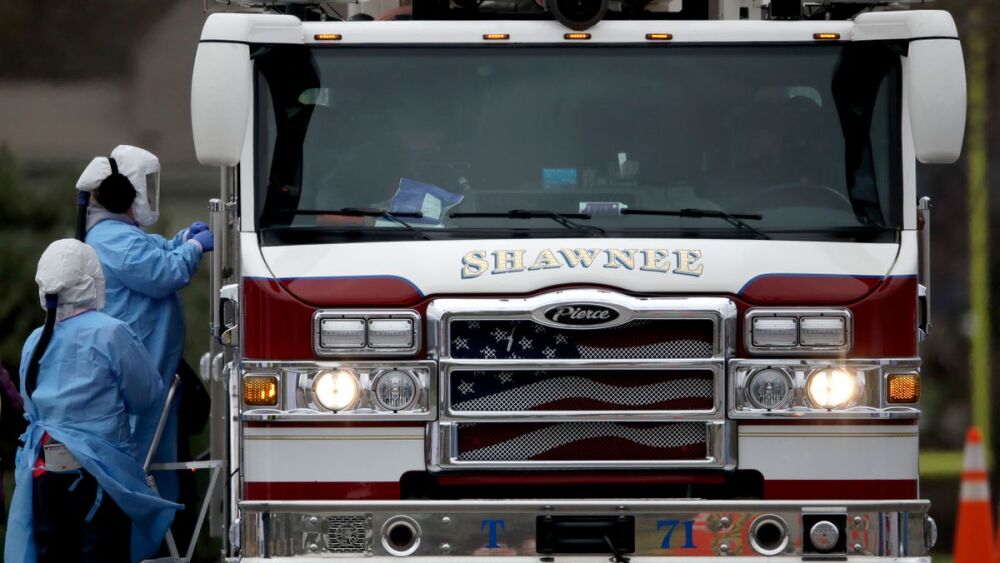Megan Stringer
The Wichita Eagle
TOPEKA, Kan. — Katie Jackson once had to stay with a co-worker for a month so she didn’t bring COVID-19 home to her children. Jackson, a mental health aid at Osawatomie State Hospital, had contact at work with patients who tested positive for the virus.
The cost to find a babysitter for her three children, one of whom has special needs, was not part of her regular budget. Instead, it was a burden on top of her paycheck when she makes $14.95 an hour.
A hazard pay increase of $3 an hour for workers like Jackson could make a big difference, she said.
“It would definitely help,” Jackson said. “That would be huge.”
The Frontline Service Pay Act, Kansas Senate Bill 289, would give a $3 an hour raise to some essential workers in Kansas up to $1,200 per employee, funded with federal relief money. The legislation applies to both public and private sector workers.
Worker advocates endorsed the legislation. Zach Helder, executive director of American Federation of Teachers-Kansas, said the pay increase was significant.
“If you make $15 an hour, that’s a 20% pay increase,” he said.
“Let’s not forget the additional burden they’ve been taking on,” Helder said of essential workers. “They’re assuming this increased risk to their health and their families, but there’s also the stress, the burnout that’s been well documented.”
AFT Kansas includes local unions with members who would experience the increased pay, including the Wichita teachers’ union at USD 259 and the Kansas Organization of State Employees, which represents corrections officers and other essential public workers in Kansas.
Kansas Senate Minority Leader Dinah Sykes, a Democrat, introduced the legislation in March, but the bill might not make it to the floor before the current legislative session ends on Friday.
In an op-ed in The Kansas City Star, Sykes wrote that she will work with Gov. Laura Kelly and Republican leadership to include the hazard pay legislation in this year’s budget.
“I introduced this bill in early March,” Sykes said in a statement. “Since then, committee chairs and Republican leadership have prioritized large corporations and have left Kansas workers behind. I will continue to advocate for this critical legislation that will compensate our essential workers for the risk they accept every day to keep our state running.”
Kansas Senate President Ty Masterson, R- Andover, did not respond to a request for comment on the bill and if it could make it into the budget.
The legislation would fund the temporary pay with federal money from the American Rescue Plan Act, the coronavirus relief bill signed by President Joe Biden last month.
Kansas is set to receive $1.6 billion in state aid from the federal legislation, which allows local governments to use the money for “premium” pay for some employees. Under the bill, Kansas would allocate at least $50 million to the Frontline Service Fund.
Employees who must work in person in often high-contact settings have been spotlighted as essential since the early days of the coronavirus pandemic.
“People who have been doing work that we cannot function without, those people are often the people making the least amount of money,” Helder said. “We’ll never fully compensate for those risks, but it’s just a little thing we can do.”
How it works
Employers would offer the raise over the course of 10 weeks. Eligible workers don’t have to take any action.
The Secretary of Commerce would disburse the funds as grant money to employers, who must apply and use the grant to pass on to workers.
The Act defines eligible essential workers as those who cannot do their jobs remotely from home. Only employees who make less than $25 an hour or an equivalent salary are eligible.
Workers in high-contact or congregate work settings are considered on the front line. That includes:
- Corrections facilities
- Behavioral health facilities, including, but not limited to, state hospitals
- K-12 schools
- Firefighters, law enforcement officers and emergency medical technicians
- Grocery stores and food services
- Critical manufacturing facilities
- Food processing facilities
- Health care facilities, including custodial and other support staff
- In-home and long-term care
- Child care providers
- Shelters for domestic violence victims or homeless persons
- Transportation workers
Employees who work for state agencies or in warehouses, agriculture or other high-risk settings for contracting COVID-19 can also be eligible for the temporary increased pay.
Loren Kriegel has been a corrections officer at the Topeka Correctional Facility for more than 20 years. He’s experienced the stress of inmates and staff at the prison contracting COVID-19.
“Now, along with dealing with the stress of living paycheck to paycheck, you’re dealing with the stress of coming down with an illness,” he said.
Kriegel has always liked his job, but has seen other staff leave because of the added pressures in the pandemic — especially correctional officers and other essential workers who can’t do their jobs from home.
“I think the hazard pay would make a difference in this,” Kriegel said. “It could give people more motivation to stick it out a little bit.”
Helder, with AFT-Kansas, said that as the Legislature considers aid to businesses impacted by health restrictions in the pandemic, lawmakers should also include the employees.
“It feels appropriate and fair to include the workers who have been at the front lines of keeping our state moving throughout the pandemic,” he said.
Jackson, at the state hospital, said she went from working 80 hours in two weeks to working 120 hours in two weeks at times during the pandemic. She would use the extra money to pay a babysitter for the additional hours she can’t be home.
“There’s definitely a lot of burnout,” Jackson said. “So if we can pay state employees even $3 more an hour, that would be huge.”
___
(c)2021 The Wichita Eagle (Wichita, Kan.)


